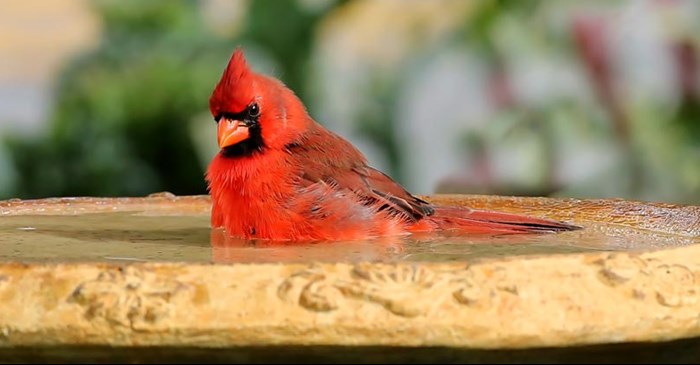It’s easy to see that a heatwave can put birds at a unique disadvantage. After all, they wear layers of feathers year-round, and they can’t sweat. On top of that, did you know their body temperature is higher than that of humans? For example, the Northern Cardinal’s temperature is around 106 degrees Fahrenheit, while a chickadee’s is about 108 degrees Fahrenheit.
Yet, when the mercury rises, the songbirds you see at your feeder do have a few tricks under their wing to avoid overheating:
- Birds play it cool. In the morning, you may hear the birds singing and calling to each other. As the sun climbs higher, especially on a hot summer day, things can get pretty quiet. Most likely, they have retreated to cooler, shady places, such as the branches of a tree. With a little luck, they may catch a breeze up in the top branches.
- Bathing is another way to cope with the heat, especially if the water temperature is cooler than the air. When the water reaches the skin, it offers some much-needed cooling relief.
- The bird may appear skinny. In the winter, birds fluff their feathers to trap heat. The opposite of that is compression, and birds will draw their feathers up close to their bodies to keep them from containing unwanted heat. (This can also have the effect of making their legs appear longer than usual, especially in larger birds.)
- Birds also pant when they’re hot. Scientists have noted that panting birds will flutter their neck muscles as a way to release heat.
- Birds will hold their wings away from their bodies. They may raise them up a bit or spread them out, so air can reach the skin beneath their feathers and remove excess heat.
When outdoor temperatures rise, offer fresh, cool water in your backyard birdbath so your songbirds can find their way to relief. Equally important is making sure their birdseed stays fresh because higher temperatures can lead to premature spoilage.
Reluctant to feed wild birds during the summer months? Try Lyric Delite No Waste Mix! This mixture is waste-free, mess-free and weed-free, ensuring that there will be nothing unwanted growing or discarded shells beneath your feeders this summer.
